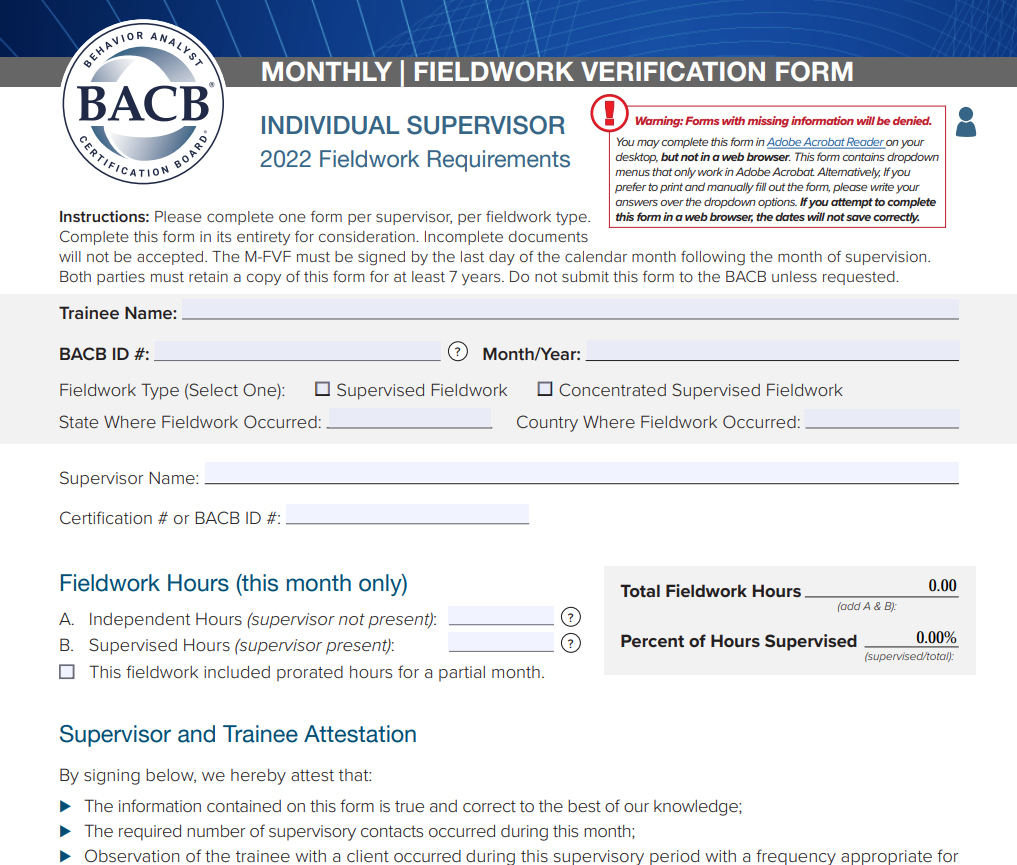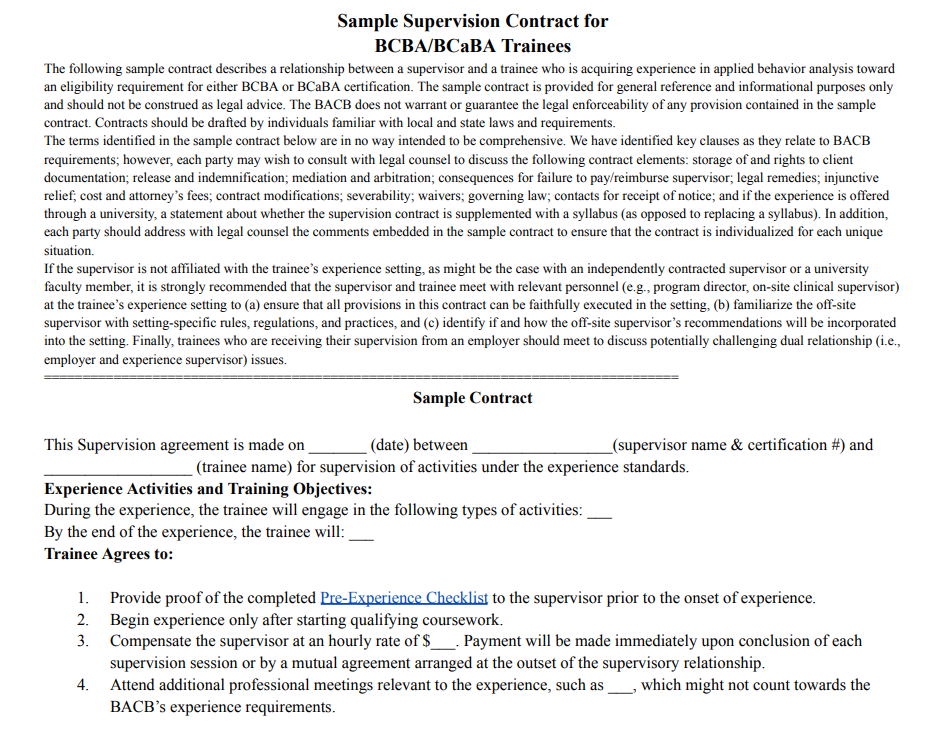In February 2024 the behavior analyst certification board (BACB) published US employment demand for behavior analysts: 2010–2023 which states
that the demand for board certified behavior analysts (BCBAs) has
increased every year since 2010- with a 14% increase from 2022 to 2023!
With this rapid increase in the need for providers- remote supervision
could help meet the demand by allowing trainees to accrue supervised
fieldwork hours more efficiently. The benefits of remote supervision and
its various platforms for both trainees and supervisors are obvious!
They include:
- Flexible Scheduling
- Diverse Supervisor Options
- Increased Opportunities for Fieldwork Hours
- Competency Tracking Tools
- Seamless Documentation Technology
- No Travel Time or Costs
- Options for Individuals in Geographically Isolated Areas (e.g. rural settings)
All
of the above are good reasons to utilize remote supervision platforms,
but as behavior analysts we must be driven by philosophic doubt- meaning
we continually question what is regarded as fact (Cooper, Heron &
Heward, 2007). Armed with doubt, let’s break down some possible
limitations of remote supervised fieldwork based on individual needs and
preferences. When considering the limitations, ask yourself:
Ethically, do you have the time-management skills for remote supervision?
Just
because remote supervised fieldwork is convenient, flexible, and cuts
down on the time spent commuting- it is still a considerable commitment.
Ethically, before entering a supervisory relationship it is important
for both parties to take accountability of their current personal, work,
and scholarly commitments to ensure that they are in a place to invest
time and resources into this relationship. Remote communication does
have the benefit of being well-documented through emails or text and
easily accessible to both parties. When deciding if a remote supervised
fieldwork is right for you- it could be easy to only focus on the
positive aspects of this supervision modality when it should be examined
as an experience that will take hard-work, planning, and effort. Ask
yourself if communicating effectively in a remote relationship might be
more time-consuming for you because you can’t just pop into a workspace
in an ABA clinic or office to ask your supervisor a quick question. On
the other hand, consider if the time you do spend with your supervisor
will be a more quality experience because it is time set aside to seek
out their guidance without the distractions of a traditional workplace.
Are you a self-starter?
Fieldwork,
remote or otherwise, requires a great deal of autonomy for the trainee.
In my experience, it is extremely difficult to continually follow up
with trainees to ensure that they are starting tasks and progressing
through their unrestricted hours for a given period. Obviously,
supervisors check-in and guide trainees- but they are usually far too
busy to walk trainees through every task they assign. Even if a
supervisor did have the time to lead a trainee through their fieldwork,
it's important to train the next generation of BCBAs to be
self-sufficient. Similarly for supervisors (unless they have a
consulting supervisor over them) most of the time their supervisory
relationships are independent. As a BCBA supervisor for close to 7
years- in my own supervisory roles I collaborated with other
professionals and BCBAs with more experience than I had, but they did
not check up on my work or supervision meetings. In the field of ABA,
you need to have the motivation and discipline to initiate supervision
tasks and finish them to completion. It is always good to have a plan
for open communication prior to the onset of supervision so that
supervisors can give trainees feedback if they need to work on their
self-management techniques.
Is there a need for you to pursue remote supervision?
Trainees,
think about the potential supervision you have access to already. If
you have a diverse group of supervisors that work in areas that align
with your goals- then you might not need to pursue additional fieldwork
opportunities. While remote supervised fieldwork can offer an even wider
range of experiences, and the chance to gain hours quicker- this might
not be necessary in every case. It is important to keep in mind that
trainees are encouraged by the behavior analyst certification board to
seek out multiple supervisors, and it may be useful for those
supervisors to be experienced in a variety of settings. If you have this
covered as a trainee- it might not be particularly useful to pursue
remote supervised fieldwork in addition to the supervision you are
already receiving.
Do you have a HIPAA compliant work area?
Another
factor to consider is the availability of a HIPAA compliant workspace
for supervision activities and meetings. Writing client reports, reading
progress notes, and even making materials may involve a client’s
personally identifiable and health information. It is important to
always have HIPAA best practices in mind when working- remotely or not.
However, when remote you may not have access to a secure office or
clinical location, so you will have to ensure your home office and
computer are HIPAA compliant workspaces to protect identities and
personal information about your clients. If you do pursue remote
supervision- a great first meeting with your supervisor could be how to
set up a secure, safe workspace for yourself that protects your client’s
confidentiality!
Do you have a plan for technical issues?
While
remote supervised fieldwork offers amazing benefits- there may be
technical issues on the trainee or supervisors end to include internet
connection problems or devices that fail. These can be frustrating, and
while they are technically a limitation- luckily, technical issues
aren't super common and can usually be avoided with planning. For
example, it’s a good idea to make sure that devices are charged before
supervision meetings. As a seasoned BCBA with years of in-home
observations– I always have a backup hotspot just in case I am somewhere
with limited wi-fi for internet connection.
Is learning about new technology or apps aversive to you?
Finally,
and maybe the most obvious reason why remote supervised fieldwork would
not be a good fit for someone is if they avoid learning about new
technology and applications. If you are not interested in seamless
supervision documentation and having forms automatically filled out- it
could be difficult to rely on these technologies. If remote supervision
platforms seem intimidating- it could be helpful to request a demo of
several different apps to see which ones you are comfortable using. It
might be scary to think about depending on an online platform to store
years of work between a trainee and BCBA supervisor. When learning about
supervision platforms, ask if any allow you to export your
documentation offline so that you can have paper copies printed for
safekeeping. Additionally, remember that utilizing an online platform to
give or receive supervision doesn’t mean you can’t start small- use the
tools offered for a few hours a week and see if they make your life
easier before fully committing to use them for your supervisory
experience. While new technology can be difficult to get the hang of,
remember that there are options for tracking BCBA fieldwork that are
user-friendly and intuitive. Consider that most of the companies you
will be working for in the field of ABA have different levels of
technology they use for billing, data collection, and session notes- so
getting comfortable with tech tools that will help during your career is
a good idea even if you feel hesitant to use them.
Additional Limitations
This
is not an exhaustive list of all of the limitations of remote
supervised fieldwork when pursuing a BCBA credential. As an analytical
field, there should be more discussion on remote supervised fieldwork
and its application as technology evolves. However, reflecting on the
constraints listed above can be an extremely helpful first step when
trying to determine if remote supervision is right for you.
REFERENCES
Behavior Analyst Certification Board. (2024). US employment demand for behavior analysts: 2010–2023. Littleton, CO: Author.
Cooper, J. O., Heron, T. E., & Heward, W. L. (2007). Applied Behavior Analysis (2nd ed.). Upper Saddle River, NJ: Pearson Education.









